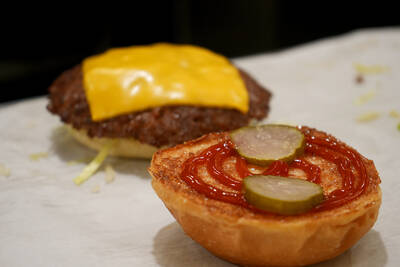Sweet Dynasty (糖朝) has earned a reputation in Hong Kong and Taiwan for excellent desserts. Its Chinese language name is a pun on Tang Dynasty, and the restaurant takes its treats seriously, with a fifth of the menu dedicated to douhua (豆花), or tofu pudding, sweet soups, bubble tea and other confections. But the restaurant’s savory dishes, which include a wide variety of dim sum staples, are hit-and-miss.
Some were very good, including the fried turnip cake (煎北菇蘿蔔糕, NT$70), which has a crispy exterior that gives way to a tender middle punctuated with crisp turnip pieces and soft mushroom slices. The steamed rice roll with shrimp (鮮玻璃明蝦腸粉, NT$160) and steamed dumpling with shrimp, pork and bamboo shoot (筍尖鮮蝦餃, NT$100) were also pleasing. The tiny bits of bamboo in the latter’s filling added a welcome contrast to the chewy rice wrapper.
The seafood and pork shiumai (海皇燒賣, NT$100), or steamed dumplings stuffed with shrimp and pork and topped with a sprinkling of shrimp roe, were a disappointment, partly because they were overcooked, leaving the wrapper slightly too chewy. The shiumai was also not served with the customary mustard dipping sauce. In fact, supplying guests with condiments seems to be a weak point in Sweet Dynasty’s service. On both our visits, we had to grab a condiment tray from a neighboring table, only to have it whisked away by staff almost immediately. They were refilling the bottles, a process that seemed to take forever.
This was unfortunate, because many of our other savory courses could have used some help. From the photo in Sweet Dynasty’s picture menu, we expected our plate of water spinach (空心菜, NT$160 or NT$220 depending on portion size) to come topped with slices of ginger, garlic, chili peppers and other exciting flavor enhancers. Instead, we got a heap of unadorned veggies so soggy it left puddles on the table whenever we lifted a portion to our plates. The fried scallops with egg white (蛋白炒帶子, NT$340 or NT$510), or a pile of sauteed scallops sandwiched in between a layer of egg white and youtiao slices, was also bland.
A meal at Sweet Dynasty should be planned so that most of what you eat comes off the restaurant’s dessert menu. Standouts include the steamed egg custard buns (蛋王蒸, NT$80), which are also available fried, and the hot tofu pudding with almond soup (豆腐花杏仁露, NT$80), a comforting pick for a cold afternoon. On warmer days, the sago soup with fresh fruit (鮮雜果西米露, NT$90), which features watermelon, cantaloupe and honeydew balls and tiny pearls made from sago palm starch floating in coconut milk, is a refreshing choice. One of the restaurant’s specialties is tofu pudding in a cask (原木桶豆腐花, NT$220) for splitting among multiple diners. On a recent weekend visit, almost every table had a wooden bucket sitting on it.

Taiwan can often feel woefully behind on global trends, from fashion to food, and influences can sometimes feel like the last on the metaphorical bandwagon. In the West, suddenly every burger is being smashed and honey has become “hot” and we’re all drinking orange wine. But it took a good while for a smash burger in Taipei to come across my radar. For the uninitiated, a smash burger is, well, a normal burger patty but smashed flat. Originally, I didn’t understand. Surely the best part of a burger is the thick patty with all the juiciness of the beef, the

The ultimate goal of the Chinese Communist Party (CCP) is the total and overwhelming domination of everything within the sphere of what it considers China and deems as theirs. All decision-making by the CCP must be understood through that lens. Any decision made is to entrench — or ideally expand that power. They are fiercely hostile to anything that weakens or compromises their control of “China.” By design, they will stop at nothing to ensure that there is no distinction between the CCP and the Chinese nation, people, culture, civilization, religion, economy, property, military or government — they are all subsidiary

This year’s Miss Universe in Thailand has been marred by ugly drama, with allegations of an insult to a beauty queen’s intellect, a walkout by pageant contestants and a tearful tantrum by the host. More than 120 women from across the world have gathered in Thailand, vying to be crowned Miss Universe in a contest considered one of the “big four” of global beauty pageants. But the runup has been dominated by the off-stage antics of the coiffed contestants and their Thai hosts, escalating into a feminist firestorm drawing the attention of Mexico’s president. On Tuesday, Mexican delegate Fatima Bosch staged a

Nov.10 to Nov.16 As he moved a large stone that had fallen from a truck near his field, 65-year-old Lin Yuan (林淵) felt a sudden urge. He fetched his tools and began to carve. The recently retired farmer had been feeling restless after a lifetime of hard labor in Yuchi Township (魚池), Nantou County. His first piece, Stone Fairy Maiden (石仙姑), completed in 1977, was reportedly a representation of his late wife. This version of how Lin began his late-life art career is recorded in Nantou County historian Teng Hsiang-yang’s (鄧相揚) 2009 biography of him. His expressive work eventually caught the attention